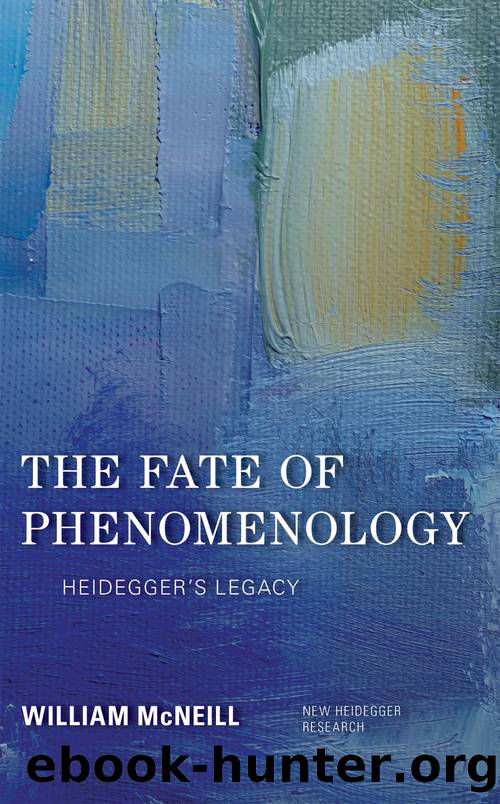The Fate of Phenomenology by William McNeill

Author:William McNeill
Language: eng
Format: epub
ISBN: 9781786608925
Publisher: ROWMAN & LITTLEFIELD
Published: 2020-07-09T16:00:00+00:00
Chapter 4
A Question of Method?
The Crisis of Phenomenology and âThe Origin of the Work of Artâ
It is frequently claimed that in his groundbreaking essay âThe Origin of the Work of Artâ Heidegger is giving a phenomenological account of art and the artwork.1 Nevertheless, there are good reasons to be suspicious of this claim, however self-evident it might appear to be. For one thing, there is the rather obvious fact that Heidegger himself never claims to be providing us with a phenomenological account of the work of art, nor does he appeal to phenomenology as the appropriate method for investigating art and its origin. The term phenomenology is never mentioned in any of the three versions of the essay to which we now have access.
Moreover, as we have seen, the publication of many of Heideggerâs lecture courses and seminars from 1927 to 1930 has shown that Heidegger appears to abandon phenomenology as the preferred method of uncovering Being as early as 1928. The term is rarely even mentioned in his lectures immediately following the course on The Phenomenological Interpretation of Kantâs Critique of Pure Reason from winter semester of 1927â1928, except in reference to other philosophers, most notably Husserl, Scheler, and Hegel. In his course on The Phenomenological Interpretation of Kantâs Critique of Pure Reason, Heidegger, as the title of the course indicates, claims to be giving a phenomenological interpretation of Kant, although he declines to specify directly what âphenomenologicalâ means here, telling us instead that âwhat phenomenology is, is to demonstrate itself in the carrying out of the interpretation itself â (GA 25, 6). The course indeed continues and extends the phenomenological interpretation of the essence of science as thematizing objectification of beings (positive sciences) or of Being (philosophy as science) that was developed the previous semester in The Basic Problems of Phenomenology. With regard to the appropriateness of a phenomenological reading of the text in question, Heidegger notes the following:
The method of the Critique is, in its fundamental stance [Grundhaltung], that which, since Husserl, we understand and enact and are learning to ground more radically as phenomenological method. For this reason, a phenomenological interpretation of the Critique is the sole appropriate one for Kantâs intentions, albeit not stated entirely clearly. (GA 25, 71)
Heideggerâs claim is based on Kantâs assertion in the first sentence of the introduction to the Transcendental Aesthetic, âthus the first sentence of the Critique proper,â that all knowledge is ultimately grounded in intuition (Anschauung) (GA 25, 82). It is this primacy of intuition that is discovered anew by Husserlâs phenomenology and made central to phenomenological method:
In the present day, Husserl, the founder of phenomenological research, has rediscovered independently of Kant this essential feature of knowledge in general and of philosophical knowledge. It is precisely this fundamental conception in phenomenology concerning the character of intuition pertaining to knowledge that contemporary philosophy resists. Yet every appeal to Kant contra phenomenology fails in principle with the very first sentence of the Critique. That knowledge is also thinking has never
Download
This site does not store any files on its server. We only index and link to content provided by other sites. Please contact the content providers to delete copyright contents if any and email us, we'll remove relevant links or contents immediately.
| Anthropology | Archaeology |
| Philosophy | Politics & Government |
| Social Sciences | Sociology |
| Women's Studies |
The remains of the day by Kazuo Ishiguro(8969)
Tools of Titans by Timothy Ferriss(8363)
Giovanni's Room by James Baldwin(7325)
The Black Swan by Nassim Nicholas Taleb(7106)
Inner Engineering: A Yogi's Guide to Joy by Sadhguru(6785)
The Way of Zen by Alan W. Watts(6600)
Asking the Right Questions: A Guide to Critical Thinking by M. Neil Browne & Stuart M. Keeley(5757)
The Power of Now: A Guide to Spiritual Enlightenment by Eckhart Tolle(5748)
The Six Wives Of Henry VIII (WOMEN IN HISTORY) by Fraser Antonia(5496)
Astrophysics for People in a Hurry by Neil DeGrasse Tyson(5181)
Housekeeping by Marilynne Robinson(4436)
12 Rules for Life by Jordan B. Peterson(4299)
Double Down (Diary of a Wimpy Kid Book 11) by Jeff Kinney(4261)
Ikigai by Héctor García & Francesc Miralles(4245)
The Ethical Slut by Janet W. Hardy(4242)
Skin in the Game by Nassim Nicholas Taleb(4236)
The Art of Happiness by The Dalai Lama(4125)
Skin in the Game: Hidden Asymmetries in Daily Life by Nassim Nicholas Taleb(3987)
Walking by Henry David Thoreau(3952)
